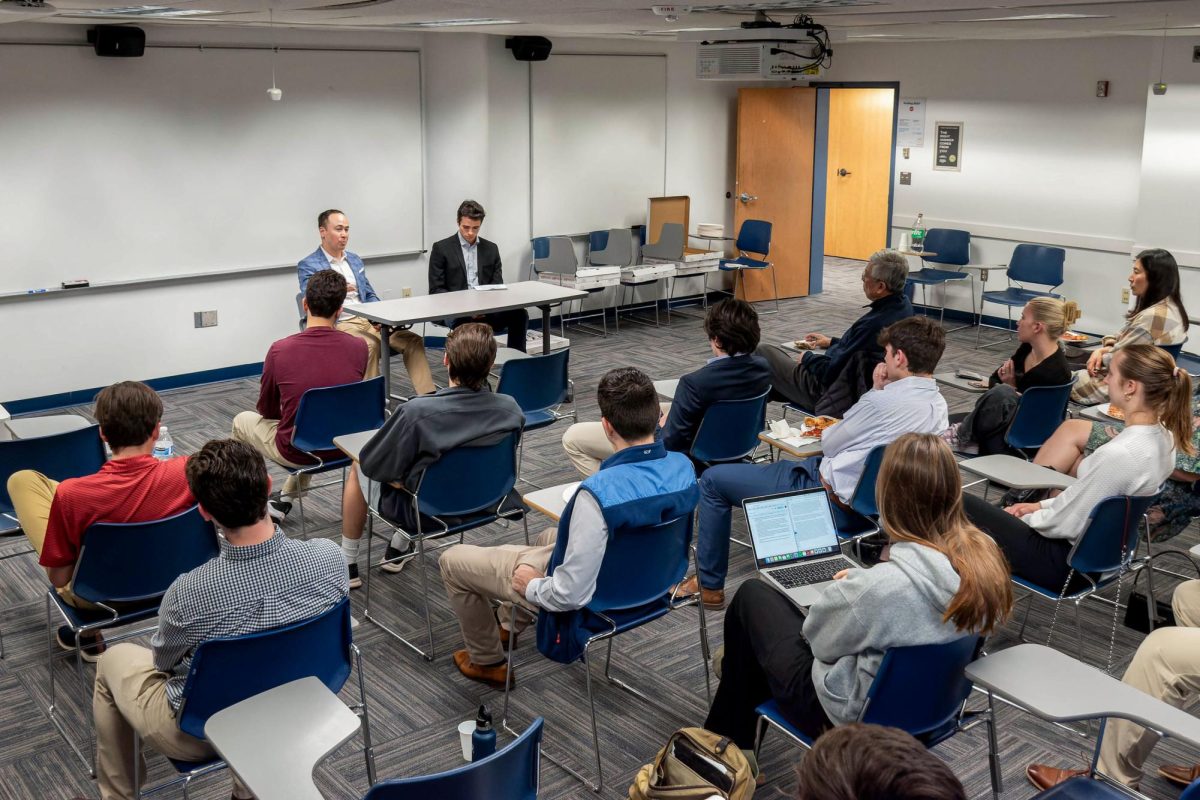An expert in U.S.-China relations spoke about tensions between the two countries in Rome Hall on Monday.
Michael Beckley, the director of the Asia Program at the Foreign Policy Research Institute and an associate professor of political science at Tufts University, said while the event was entitled “The Long Game: Securing America From China’s Rise,” he is concerned that China will become “more aggressive” toward the United States and allies in the short term. GW College Republicans hosted the conversation with moderator Jack Fisher, a senior and the student organization’s director of political affairs.
Beckley said he worries China may be learning from Russian President Vladimir Putin’s invasion of Ukraine to attack on a large and “brutal” scale, instill fear by threatening to use nuclear weapons and prepare for a “protracted conflict” if they invade Taiwan. Beckley said President Joe Biden’s vow to defend Taiwan from a Chinese invasion is “very credible” because the U.S. government, specifically the Pentagon, has been “gearing up” for that.
“China offset U.S. military superiority brilliantly: long range missiles; anti-satellite weapons to render U.S. forces deaf, dumb, blind and mute, electronic warfare; and the United States is still clinging to this sort of outmoded way of war that revolves around a few exquisite platforms like aircraft carriers, short range aircraft,” Beckley said. “The United States has to diversify away from that.”
While the U.S. does not recognize Taiwan as a sovereign nation, it has strong relations based on key trading and military partnerships, according to the U.S. State Department.
Beckley said he would like to see less “showmanship” in American interactions with Taiwan — which he feels currently focus on sending symbolic messages to China about American support, like high publicity diplomatic meetings with Taiwan — and more preparation for military action from Beijing.
Beckley said the House of Representatives’ recent bill potentially banning TikTok is necessary based on the messaging that the app’s algorithm promotes, adding that the amount of “pro-Hamas” messaging is higher on TikTok than any other social media platform. TikTok pushed back against claims that the app promoted a disproportionate amount of pro-Palestinian content, saying that its algorithm doesn’t “take sides” and that young people’s attitudes are already skewed in favor of Palestine in a November blog post.
“It just seems like if there is going to be increasing tensions, as unfortunately I expect there to be, between the United States and China, it’s not great to have your main geopolitical adversary owning the major way that people your age are getting their news,” he said.
Beckley said he does not think the U.S. should compete with China’s increasing influence over developing nations by way of its Belt and Road Initiative — China’s multi-billion dollar program focused on providing investments and infrastructure to developing nations — especially if the program is providing critical infrastructure to countries in need. He said he is worried about the “digital authoritarian model” that he said the BRI is spreading, which has involved authoritarian nations employing Chinese companies to install surveillance infrastructure like camera and facial recognition technologies in their cities.
“My worry is that as China expands this area, not only are these countries obviously dependent on Chinese finance and technology, but they sort of get locked into these digital ecosystems that seem to really prop up autocratic governments,” Beckley said.
Beckley said Americans tend to think authoritarian nations won’t engage in disputes unless provoked, but that they don’t understand how the rise in popularity of values like freedom and democracy itself concerns authoritarian leaders, who view the ideals as a threat to their power.
“The system that we’re trying to uphold, this sort of liberal order where goods and ideas and people should be able to move around borders, if you want to maintain tight monopoly control on political power over a massive country, that’s just inherently a threat,” Beckley said.





